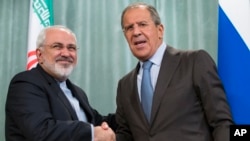Russia's top officials on Tuesday hailed the agreement that world powers reached with Iran to restrict its nuclear program in exchange for lifting economic sanctions. However, some Russian observers warned that it may be a case of "be careful what you wish for."
President Vladimir Putin said in a statement that the world “breathed a huge sigh of relief” with the signing of the deal. Russia, he said, will do everything in its power to ensure the agreement works to the fullest extent to promote “the strengthening of international and regional security, and the global nuclear nonproliferation regime,” as well as a Middle East “free of weapons of mass destruction and their means of delivery” and “a broad coalition in the region to counter the terrorist threat.”
The Russian Foreign Ministry issued a similar statement Tuesday, welcoming the agreement and adding that it should mean the possibility military force will be used against Iran is now ruled out.
For his part, Foreign Minister Sergei Lavrov told reporters in Vienna after the deal was signed that Russia will “participate actively at all stages of the implementation of this agreement.” Echoing Putin, he said Moscow will work toward convening a conference “on creating a zone free of weapons of mass destruction in the Middle East.”
However, Lavrov also made several comments that could signal future stumbling blocks in the implementation of the agreement. He recalled comments made in April 2009 by President Barack Obama, who said in a speech in Prague that if “the Iranian threat is eliminated,” the “driving force” for building a missile defense system in Europe “will be removed.”
“Today, we drew the attention of our American colleagues to this fact,” the Russian foreign minister said. “We will await a reaction.”
Arms embargo
Lavrov also said during the negotiations leading to the deal that Russia, along with China, had wanted the arms embargo against Iran be among the first sanctions lifted, while the U.S. and its allies had insisted the arms embargo remain in force for an additional eight or even 10 years.
According to the Russian foreign minister, Tehran agreed to a compromise by which the arms embargo will remain in place for another five years, but with the caveat that arms deliveries to Iran during those five years will be possible as long as they are subject to the “appropriate notification procedures and verification through the U.N. Security Council.”
The issue of lifting the arms embargo is likely to be a key focus of opponents of the agreement. Congressman Ed Royce, the Republican chairman of the U.S. House of Representatives Foreign Affairs Committee, said Tuesday that, to his knowledge, the agreement stipulates that the arms embargo will be lifted in five years and that Moscow will be able to transfer ballistic missile technology to Tehran “within eight years.” Royce said his committee would look closely at what the agreement says about the time frame for ending the arms embargo.
Russian Foreign Minister Lavrov predicted Tuesday that the lifting of what he called “the unilateral and illegal sanctions against Iran” will boost economic ties between Russia and Iran, adding that his country has “very ambitious plans for the development of Iranian nuclear power.”
The oil factor
Others, however, had a gloomier assessment of the effect the agreement will likely have on the Russian economy. Andrei Dirgin, head analyst at the Russian brokerage Alfa-Forex, wrote Tuesday that the signing of the nuclear deal and the return of Iran - which has the world's fourth biggest crude oil reserves - to the international oil market is likely to be a “strong shock” for the Russian market and the value of the ruble, already battered by the drop in world oil prices and Western economic sanctions over Russia's actions in Ukraine.
“Iran is preparing to win back market share from the Saudis, and there is a high probability this will be achieved through a sharp increase in oil exports and dumping,” Dirgin wrote. “This can bring down quotes for hydrocarbons on the world market, which, in turn, will pull down our currency.”
Other Russian analysts said Tuesday that it is too early to assume the Iran agreement is a fait accompli.
"Serious initiatives on Iran's nuclear program have been taken before - in 2004 and 2009," Alexei Fenenko, a senior research fellow at the Russian Academy of Sciences' Institute of International Security Studies, told VOA's Russian service. "The relevant agreements were initialed and even signed, but at the last minute everything fell through."












